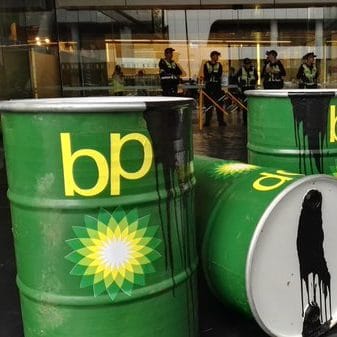Activists denounce BP’s plans to drill for oil in the Great Australian Bight
🔗 [SYSTEM UPDATE] Link found. Timestamp incremented on 2025-11-26 13:55:13.With the Senate verdict on BP’s plans to drill in Great Australian Bight due next month, activists are attempting to ensure the project is buried in a watery grave.


By JOSHUA KAYE
Activists are placing increasing pressure on BP to abandon its plan to drill in the Great Australian Bight, as the deadline for a Senate inquiry into the oil giant's environmentally sensitive proposal approaches.
BP is seeking approval to construct four exploratory wells in the bight throughout the summer of 2016-2017.
Each well will take up to 170 days to drill and will be located 400km west of Port Lincoln and 300km southwest of Ceduna in South Australia.
The Wilderness Society of South Australia and ocean activists Sea Shepherd are among the many groups calling for BP’s proposal to be rejected.
The Senate inquiry into the drills was due for report back today (May 12), but the deadline has been extended to June 20.
Members of both organisations staged a mock oil spill outside the company’s Melbourne headquarters last month, wearing white hazmat suits and chanting: "BP has no right to risk the Bight".
Wilderness Society of South Australia campaign manager Peter Owen said carrying out high-risk exploration in the middle of the bight’s whale nursery was "the height of irresponsibility".

"It’s a totally inappropriate place to do it and a totally inappropriate point in the planet’s history to be trying to expand the fossil fuel industry," he said.
Mr Owen specifically questioned BP’s reasoning in light of recent commitments to tackle climate change.
"Unfortunately [BP] is still stuck in a very outdated mindset that is now extremely dangerous for the future of this planet. We cannot continue to expand the fossil fuel industry," he said.
The protest coincided with similar action at BP’s annual shareholder meeting in London, forming part of an international effort to hold the company responsible for environmental disasters.
Last month marked six years since the Deepwater Horizon spill in the Gulf of Mexico – the largest in US history. Recent reports have shown that traces of oil and chemical dispersants from the catastrophe can be found in in wildlife across the US, with effects of the spill still unknown.
Objectors argue that there is a high risk that a similar disaster could occur in the Great Australian Bight, potentially destroying local tourism and ocean industries.

Sea Shepherd media coordinator Nelli Huié said it was this threat that motivated the Sea Shepherd to join with the Wilderness Society in encouraging people to fight the project.
"We hope to … get community groups in coastal areas that would be affected by a potential oil spill to mobilise and realise that this is something they can fight," she said.
"Sometimes there are issues that are so great and affect so much of this country’s beautiful oceans that we all have to come together and work on it."
As part of their campaign, members of both organisations sent "very convincing" submissions into the Senate enquiry, Ms Huié said.
While BP is yet to respond to any of their complaints, Sea Shepherd is adamant it will continue to fight for the preservation of Australia’s marine areas.
Similarly, Mr Owen warned that if the project went ahead, BP and the Government would be held responsible by future generations.
"In time, governments that are allowing these companies to do this type of thing are going to have to answer to the people," he said.
More information on the Senate Enquiry and submissions received by the Standing Committee on Environment and Communications can be found here.





